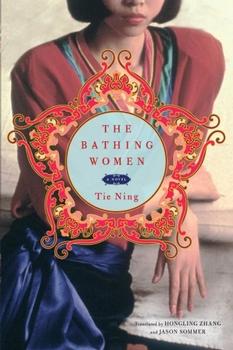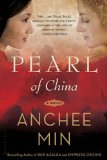Summary | Excerpt | Reading Guide | Reviews | Beyond the book | Read-Alikes | Genres & Themes | Author Bio

A Novel
by Tie Ning"But most of the time she didn't feel she was a Beijinger, nor did she feel she was a provincial person, a Fuaner. She felt she didn't belong anywhere, and she often thought this with some spite, some perverse pleasure. It was almost as if she made herself rootless on purpose."
These are the conflicting thoughts of Tiao, one of the main characters in Chinese novelist Tie Ning's English-language debut. Translated by Hongling Zhang and Jason Sommer, The Bathing Women expertly shuttles between circumstance and personal choice, as well as the loss of a generation and haunting memories. It also deftly explores the struggle to maintain relationships in a swiftly changing capital city and the disjointed emotions arising from living as a foreigner in Chicago. Ning creates an impressive, expansive portrait of survival and love through the story of Tiao's life working as a Bejing editor in the 1990s, which includes her younger sister, Fan, as well as her friends Fei and Youyou, juxtaposed with their childhood stories of being raised during China's cultural revolution.
In the late 1960s, Tiao's parents, Wu and Yixun, are sent to Reed River Farm as part of Chairman Mao's re-education program. Tiao resents being left alone to care for Fan. But it is not until Wu returns home by feigning illness with the help of Dr. Tang, and a death occurs that has something to do with Wu and Dr. Tang's relationship, that the plot of The Bathing Women is truly set in motion. Other harsh incidents begin to unfold, including the shaming of a woman by forcing her to consume excrement as punishment for bearing a daughter out of wedlock, the gang rape of an older woman accused of being a spy, an abortion conducted in secret, and the suicide of a man who is discovered in flagrante delicto. All of these build and exemplify an oppressive atmosphere. Yet, in a period when being labeled as a bourgeois intellectual or failing to tow the party line could lead to public denunciations as well as severe consequences, Tiao and her sister and friends carve out a measure of respite for themselves.
Ning portrays adolescence amid hardship with an especially keen sense of pleasures often taken for granted, which then resound all the more for their simplicity. Whether writing of Tiao, Fei, and Youyou's gastronomic explorations through the pages of Soviet Woman magazine, the delight in procuring extra rations, or in sharing conversation during a revolution which forbade private gatherings through slogans such as "Revolution is not inviting friends for dinner," Ning ably captures these girls' spirited defiance as they grow into determined women who fend for their personal interests. Though Ning refrains from drawing overt connections between past emotional deprivation – real or perceived – and the difficulty in finding fulfillment in the future, one can't help but surmise that Tiao and Fei, especially, have felt the profound effects of their troubled past, and that love, for them, is heightened by the search for security.
But love arrives with complications for these women. Tiao is angered by her mother's faithlessness but does not hold her own relationships with married men to a high standard; Fan, whose husband is having an affair, dwells in a state of critical dissatisfaction with her family and life; Fei prostitutes herself whenever she finds herself in need; and Youyou, who seemingly turned out the happiest, disagrees, referring to herself as "stagnant water." Considering that negative emotions – from blame to guilt, and vanity to selfishness – swirl around these women, The Bathing Women could depict a dispiriting portrait of adulthood, yet Ning prevents it from turning bleak with scenes that reveal the more positive nuances of female relationships. Her insightful portraits of human nature also make it difficult to grow frustrated with her characters' actions; their vulnerabilities are nearly always grounded in sympathetic contexts. Tiao and Fan's sibling rivalry is also particularly well drawn, providing a balance of humor and a darker, shared knowledge that threatens to divide them.
For those who were born outside of communism, The Bathing Women sheds light on some of the Cultural Revolution's tragedies and effects on young people, but it is not political strife that marks this work as noteworthy – it is the careful exploration of love, loss, and the challenges of friendship and sisterhood that extend across time and culture which leave a lasting impression. The "rootlessness" Tiao articulated so well becomes a moving example of the problems of situating oneself in the modern world, as well as, ultimately, learning self-acceptance.
![]() This review was originally published in The BookBrowse Review in November 2012, and has been updated for the
October 2014 edition.
Click here to go to this issue.
This review was originally published in The BookBrowse Review in November 2012, and has been updated for the
October 2014 edition.
Click here to go to this issue.

If you liked The Bathing Women, try these:

by Kay Bratt
Published 2013
Inspired by a true story, and set against the backdrop of a country in transition, The Scavenger's Daughters is a sweeping present day saga of triumph in the face of hardship, and the unbreakable bonds of family against all odds.

by Anchee Min
Published 2011
From the bestselling author of Red Azalea and Empress Orchid comes the powerful story of the friendship of a lifetime, based on the life of Pearl S. Buck.
We've heard that a million monkeys at a million keyboards could produce the complete works of Shakespeare...
Click Here to find out who said this, as well as discovering other famous literary quotes!
Your guide toexceptional books
BookBrowse seeks out and recommends the best in contemporary fiction and nonfiction—books that not only engage and entertain but also deepen our understanding of ourselves and the world around us.